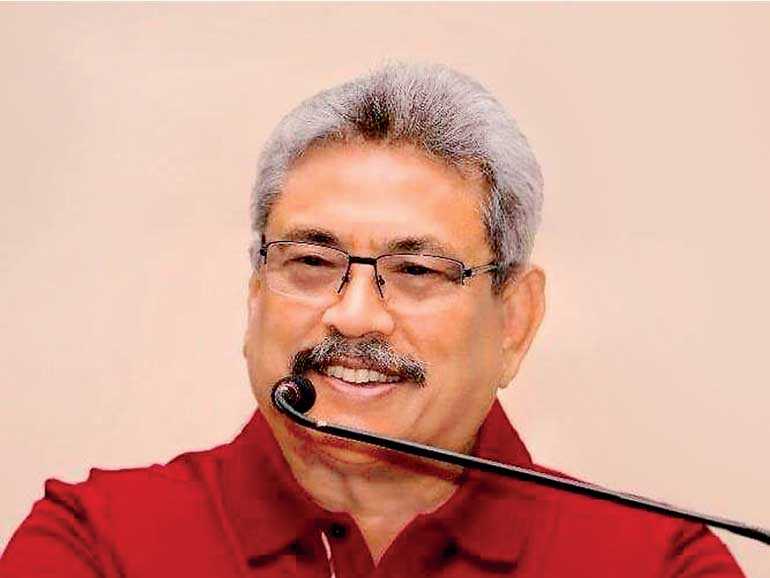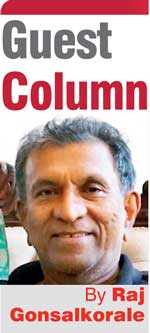Friday Feb 20, 2026
Friday Feb 20, 2026
Tuesday, 7 January 2020 00:00 - - {{hitsCtrl.values.hits}}

The challenges ahead of President Gotabaya Rajapaksa are immense. These challenges are not ones he could address alone. The public must show their willingness to be partners in all such endeavours as the effort to transform society has to be a collective one where ownership is participative and broad based
President Gotabaya Rajapaksa outlined his and his Government’s policies during the opening of the Parliament on 3 January. He emphasised on the need for transformation of all segments of the society with a singular focus on economic transformation based on a knowledge-based future. The traditional rhetoric flourishes were absent, and the President gave a clear impression that he was a man of few words and he was action oriented.
Whether or not one agrees with him and his policy statement, one will find it difficult disagree that there is a clear action-oriented focus in his approach and that he seeks an end to divisive politics. It was a welcome change from earlier occasions when political leaders did their best to demonstrate they were super humans and above the status of ordinary human beings.
The advent of Gotabaya Rajapaksa to the presidency of the country is viewed by many in a positive light. Even some UNPers seems to admit this privately, and perhaps grudgingly, although the traditional party line sympathy prevents them from airing their views publicly. Some reservations that appear to cloud the positive outlook of the new President seems to be summed by what some say “Gotabaya is good, but those surrounding him are the usual self-serving, discredited politicians”.
Of course those opposed to the Rajapaksa political family, some with good reason, are impatient and they expect the new President and the Government to change five years of negativity in one month. Amongst those supporting the President, there may be some who are not entirely happy with the new Presidents style and substance. Those who waited for a largesse to come their way in the form of contracts, bribes, luxury vehicles and jobs for the family, may be disappointed. 
Hopefully, they will continue to be disappointed as they are the ones, in both sides of the political divide, who brought the entire political structure and the process to utter disrepute. While a generalisation would be unfair on some hardworking, honest politicians, unfortunately, politicians are regarded as the scum of society by many. The Presidents resolve to clean this muck is laudable although he may be faced with a mission impossible.
Many use one word to describe the new President’s resolve. Guts. In 2020 and beyond, the wish of many is that not just the President, but the Prime Minister, ministers, parliamentarians on both sides will have the guts to do what is right. However, this is not enough as doing what is right has to be a partnership between those governing and those who are being governed.
No doubt the leadership has to be from those who are governing, and the President appears to be leading the way in trying to do what is right. Guts are needed from all to do what is right.
There are many political, social and societal issues that needs to be looked at from the prism of what is right.
Forging unity, ushering safety and security
A burning issue that has not been addressed adequately by successive governments is the issue of inter-ethnic relationships. A possible real test whether relationships are what they should be in a multi ethnic, multi religious and multi-dimensional social stratification environment maybe whether everyone feels inclusive and therefore safe and secure in the country. The test might be whether everyone could say this country is a safe place for them irrespective of who they are and where they live.
In the Sri Lankan current context, being secure may be safety secured through the Armed Forces and the Police while being safe may mean being safe from fellow citizens.
July 1983 was a watershed in the country’s ethnic relations history when the absence of a sense of safety for some citizens from others reached a crescendo. A government led or endorsed pogrom that was unleashed on the Tamil citizens of the country by a section of the then government’s mobsters set the country back perhaps irrevocably.
Many are of the view that it had the implicit and explicit sponsorship of that government and its highest leadership. Sri Lanka has never fully recovered from that despicable violence and the period and events that followed are well etched in the minds of Tamil people, and understandably, their sense of acute Tamil nationalism, and amongst some, the concept of Tamil nationhood grew as a consequence.
In July 1983, Tamil citizens of the country no longer felt that they were safe amongst the Sinhalese, not because they were Sinhalese, but because the government led by a Sinhala majority had taken away their sense of safety and security, and above all, their pride and self-respect.
The new President and the government has to recognise that they need to take measures to make the Tamil citizenry feel they are safe, they are inclusive, they are equal, and at the same time recognise they are culturally and linguistically different to the Sinhala community. There has to be recognition that economic development alone will not make Tamil citizens feel they are safe anywhere in the country.
On the same token, forging unity, ushering safety and security has to be above divisive politics and it needs partnerships, mutual respect and the recognition of some ground realities. Sri Lanka being predominantly, but not exclusively, Sinhala Buddhist in its cultural orientation is one such reality. Sri Lankan culture will always be mixed, as it should be, but it is and will be predominantly Sinhala Buddhist irrespective of whether one likes it or not, and unity, safety, and security has to be forged within this reality.
Transforming the country’s economic status
The President outlined several measures that will be taken to transform the country’s economic status. He hopes that this will address and resolve many other societal issues. No doubt many commentators will discuss these and debate the pros and cons of these in the comings days and weeks.
He did indicate another feature he hopes will underpin his presidency, ushering a corrupt free, disciplined society. This is a huge task and perhaps even more onerous than an economic transformation as the two are linked and running like wild horses. A State-driven effort to curb corruption and indiscipline without the support and participation of the general public has its own pit falls, although both need the tools and levers of State machinery.
Freeing the country from corruption may require the jailing of several politicians to begin with. It’s bizarre that those who have taken corruption to new heights are still in Parliament and calling on others to be free of corrupt activities. The punishment that should be meted out to politicians has to be far more severe than what is meted out to ordinary citizens as they are the temporary custodians of the ordinary citizen’s trust. Breaking this trust should be listed as a major crime if succeeding generations of politicians are to be honest.
Corruption has pervaded to such an extent that money now makes anything that is black, white in colour and anything in white, black in colour. Broadly, indiscipline, exists and flourishes due to corruption and the acceptance that indiscipline is “Ok” and it is a way of life now.
The way Sri Lankan road traffic moves is a good example of indiscipline and perhaps a reflection of who we are and how our minds work.
Amongst the most errant are bus drivers and three wheel drivers who are a law onto themselves. Any spot on the road is a bus stand for bus drivers. Driving on the left side of the road is a rule for others and not for them. Bus drivers think they are three wheeler drivers and they could creep into any space between other vehicles however small that space is. According to the latest WHO data published in 2017, Road Traffic Accidents Deaths in Sri Lanka reached 3,554 or 2.80% of total deaths. No doubt errant bus drivers have caused many of these deaths. Who amongst the politicians, including the President, will have the guts to bring some discipline onto the roads and end the recklessness of bus drivers and three wheel drivers?
Urban and rural planning
Another area of indiscipline that is increasingly flourishing is the indiscriminate urban sprawl. It appears that residential areas are no longer strictly residential and commercial enterprises can be set up anywhere by anyone, perhaps if they “look after” those who make decisions.
Each local government entity should be directed by the President to conduct surveys within the jurisdiction of each such entity to ensure the laws and regulations governing demarcation of areas as residential areas are enforced.
The surfeit of apartment complexes coming up in Colombo and the environments also poses a question whether this activity is disciplined and planned.
All these buildings require parking spaces, adequate and uninterrupted electricity and water and also provisions for traffic flows as a consequence of such constructions.
It does not appear to the lay-person’s eyes that these key issues have been considered judging from the chaos that one witnesses with traffic congestion in many part of the city. As far as existing constructions go, attending to these concerns may be akin to closing the stable doors after the horses have fled. It is however very pertinent for town planners to make sure all aspects that are mentioned here and other relevant issues are looked into before permitting additional apartment and office complex buildings.
According to census statistics, the population of the country had doubled in the last 60 years, while interestingly, in the next 30 years, it is expected to gradually reduce, and in 2050, to under 20 million people. Based on these statistics, Sri Lanka has in all likelihood reached its zenith in terms of its population.
If this were so, urban and rural planning should have been done in a more systematic and scientific way and not what appears to be in a haphazard way. Town and country planners could assure the public of the measures they have taken and been taking to ensure there is some method in what many see as a madness.
The seemingly-unplanned urban sprawl and the concentration of schools in urban areas, particularly in Colombo, have spilled into endless traffic queues during morning and evening rush hours. While the government of President Mahinda Rajapaksa took some measures to address this, the last five years have not witnessed any initiative to address this issue. A holistic strategic approach is required to address this issue as the location of offices, schools, transport facilities, etc., are key factors to be considered in such a holistic approach.
As a former Urban Development Authority head, and a person who demonstrated his ability to plan and execute, it is hoped that President Gotabaya Rajapaksa would now commission a 10-20 year strategic plan which among other things, will encompass the location of schools, offices, residences, open spaces to serve as the “lungs” for the community, road networks, transport methodologies, water and energy requirements, a policy on motor vehicle use in urban areas etc, in order to ensure the future generations will witness a more orderly, green and planned cities are there for them to live in.
The challenges ahead of President Gotabaya Rajapaksa are immense. These challenges are not ones he could address alone. The public must show their willingness to be partners in all such endeavours as the effort to transform society has to be a collective one where ownership is participative and broad based.